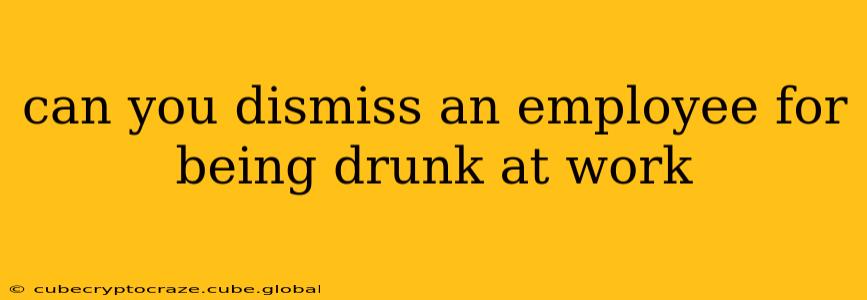Can You Dismiss an Employee for Being Drunk at Work?
Yes, generally speaking, you can dismiss an employee for being drunk at work. This is a serious disciplinary offense that can, and often does, lead to immediate dismissal. However, the specifics depend heavily on several factors, including your location, company policy, and the employee's history. Let's delve into the details.
What constitutes being drunk at work?
This isn't always straightforward. Obvious signs of intoxication, such as slurred speech, unsteady gait, strong smell of alcohol, and erratic behavior, are clear indicators. However, even if an employee isn't exhibiting these overt signs, if their performance is demonstrably impaired due to alcohol consumption, disciplinary action is warranted. This could include decreased productivity, errors in judgment, or unsafe work practices.
Is there a legal process I need to follow?
The legal process for dismissing an employee for being drunk at work varies significantly by location. However, several common steps are crucial to ensure a legally sound dismissal:
-
Company Policy: A robust and clearly communicated company policy regarding alcohol and drug use in the workplace is paramount. This policy should outline the consequences of violating the policy, including potential dismissal. Ensure the employee has received, understood, and acknowledged this policy.
-
Investigation: Conduct a thorough investigation. This might include witness statements from colleagues, security footage, and potentially a breathalyzer test (depending on local laws and company policy – always be mindful of employee rights). Document everything meticulously.
-
Disciplinary Meeting: Hold a formal disciplinary meeting with the employee. Allow them to present their side of the story and provide evidence, if any. This meeting should be documented accurately.
-
Fair Procedure: Ensure fair and consistent procedures are followed throughout the process. This includes giving the employee a chance to respond to accusations, providing opportunities for appeal if necessary, and treating similar situations consistently across the workforce.
-
Legal Advice: It is highly recommended to seek legal counsel before initiating dismissal proceedings. This ensures compliance with all applicable laws and regulations.
What if the employee has a history of alcohol abuse?
If the employee has a documented history of alcohol-related issues at work, the dismissal process might be slightly different. While immediate dismissal is still possible, depending on the severity and frequency of previous incidents, you might be required to offer support and reasonable accommodations, such as referral to an employee assistance program (EAP). However, continued substance abuse after warnings and support is still grounds for dismissal.
Can I dismiss an employee on the spot?
While immediate dismissal is possible, especially in cases of extreme intoxication or severe safety violations, it's generally advisable to follow a more formal process. This minimizes the risk of legal challenges and demonstrates fairness. The best course of action is to consult with HR and legal counsel before making any final decisions.
What if the employee claims discrimination?
An employee can claim unfair dismissal or discrimination if they believe the dismissal was based on factors other than their intoxication. Maintaining thorough, unbiased documentation and following fair procedures are crucial to avoid such claims.
In conclusion, dismissing an employee for being drunk at work is possible, but it must be done correctly and legally. Always consult with legal and HR professionals to ensure compliance with all relevant laws and to protect your business from potential liabilities. A well-defined company policy, thorough documentation, and a fair process are essential elements of a successful and legally sound dismissal.
